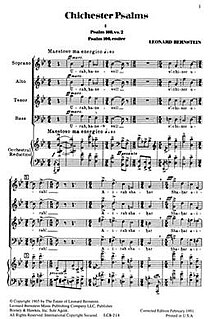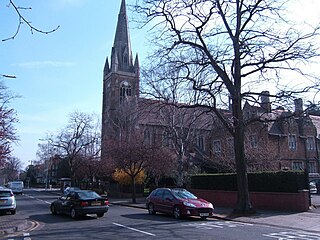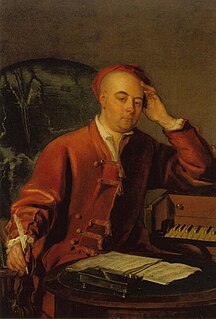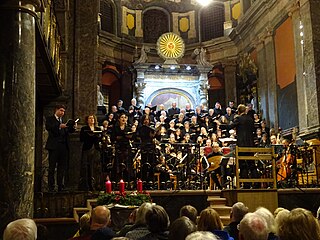
Saint Nicolas, Op. 42, is a cantata with music by Benjamin Britten on a text by Eric Crozier, completed in 1948. It covers the legendary life of Saint Nicholas, Bishop of Myra, Lycia, in a dramatic sequence of events. The composer wrote the work for the centenary of Lancing College in Sussex, with the resources of the institution in mind. It is scored for mixed choir, tenor soloist, four boys singers, strings, piano duet, organ and percussion. The only professionals required are the tenor soloist, a string quintet to lead the other strings, and the percussionists. Saint Nicolas is Britten's first work for amateur musicians, and it includes congregational hymns. The premiere was the opening concert of the first Aldeburgh Festival in June 1948, with Peter Pears as the soloist.

Chichester Psalms is an extended choral composition in three movements by Leonard Bernstein for boy treble or countertenor, choir and orchestra. The text was arranged by the composer from the Book of Psalms in the original Hebrew. Part 1 uses Psalms 100 and 108, Part 2 uses 2 and 23, and Part 3 uses 131 and 133. Bernstein scored the work for a reduced orchestra, but also made a version for an even smaller ensemble of organ, one harp, and percussion.

Noye's Fludde is a one-act opera by the British composer Benjamin Britten, intended primarily for amateur performers, particularly children. First performed on 18 June 1958 at that year's Aldeburgh Festival, it is based on the 15th-century Chester "mystery" or "miracle" play which recounts the Old Testament story of Noah's Ark. Britten specified that the opera should be staged in churches or large halls, not in a theatre.

A Ceremony of Carols,Op. 28, is an extended choral composition for Christmas by Benjamin Britten. scored for three-part treble chorus, solo voices, and harp. The text, structured in eleven movements, is taken from The English Galaxy of Shorter Poems, edited by Gerald Bullett. It is principally in Middle English, with some Latin and Early Modern English. It was composed in 1942 on Britten's sea voyage from the United States to England.

Rejoice in the Lamb is a cantata for four soloists, SATB choir, and organ composed by Benjamin Britten in 1943 and based on the poem Jubilate Agno by Christopher Smart (1722–1771). The poem, written while Smart was in an asylum, depicts idiosyncratic praise and worship of God by all created beings and things, each in its own way. The cantata was commissioned by the Reverend Walter Hussey for the celebration of the fiftieth anniversary of the consecration of St Matthew's Church, Northampton.

The Missa brevis in D, Op. 63, is a setting of the Mass completed by Benjamin Britten on Trinity Sunday, 1959. Set for three-part treble choir and organ, it was first performed at London's Roman Catholic Westminster Cathedral on 22 July of the same year. Britten composed the Mass for George Malcolm's retirement as organist and choirmaster at Westminster: the printed dedication reads "For George Malcolm and the boys of Westminster Cathedral Choir". It was Britten's first and only setting of the Mass. Malcolm's live recording, from a service at the cathedral, lasts ten minutes.

The Reger-Chor is a German-Belgian choir. It was founded in Wiesbaden in 1985 and has been conducted by Gabriel Dessauer in Wiesbaden. Since 2001 it has grown to Regerchor-International in a collaboration with the organist Ignace Michiels of the St. Salvator's Cathedral of Bruges. The choir performs an annual concert both in Germany and Belgium of mostly sacred choral music for choir and organ. Concerts have taken place regularly in St. Bonifatius, Wiesbaden, and in the cathedral of Bruges in its series "Kathedraalconcerten". The choir performed additional concerts at other churches of the two countries and in the Concertgebouw of Bruges.

Utrecht Te Deum and Jubilate is the common name for a sacred choral composition in two parts, written by George Frideric Handel to celebrate the Treaty of Utrecht, which established the Peace of Utrecht in 1713, ending the War of the Spanish Succession. He composed a Te Deum, HWV 278, and a Jubilate Deo, HWV 279. The combination of the two texts in English follows earlier models. The official premiere of the work was on 13 July 1713 in a service in St Paul's Cathedral in London.

Prelude and Fugue on a Theme of Vittoria is a work for solo organ composed by Benjamin Britten in 1946. It was commissioned for St Matthew's Church, Northampton and first performed on 21 September 1946, St Matthew's Day, three days after its composition. It uses a theme from a motet by the Spanish composer Vittoria, both in the prelude and as the basis for the fugue. The piece, which lasts about five minutes in performance, has had a mixed reception. One writer has noted the difficulty on finding a suitable organ on which to perform the piece, given the difficulties in finding appropriate registration to meet Britten's requirements. A reviewer of a concert performance in the 1960s called it "a contrived attempt to make bricks without straw", although other commentators have been more favourable about the piece.

The Te Deum in C is a sacred choral composition by Benjamin Britten, a setting of the Te Deum on the English text from the Book of Common Prayer. Britten wrote it in 1934 between 11 July and 17 September, scored for treble solo, four-part choir (SATB) and organ.

St Mark's Church is in Church Place, Swindon, Wiltshire, England. It is an active Anglican parish church in the deanery of Swindon, the archdeaconry of Malmesbury, and the diocese of Bristol. Its benefice is united with those of St Aldhelm, Swindon, St Luke, Swindon, and St Saviour, Swindon, to form the benefice of Swindon New Town. The church is recorded in the National Heritage List for England as a designated Grade II listed building.
A Boy Was Born, Op. 3, is a choral composition by Benjamin Britten. Subtitled Choral variations for men's, women's and boys' voices, unaccompanied , it was originally composed from 1932 to 1933. It was first performed on 23 February 1934 as a BBC broadcast. Britten revised the work in 1955. The composer set different texts related to Christmas to music as theme and variations, scored for an a cappella choir with boys' voices.

Idsteiner Kantorei is a mixed choir in Idstein, Rheingau-Taunus-Kreis, Germany. The group performs regularly in the Protestant Unionskirche in services and concerts, also in smaller churches of the region and internationally. They practice collaboration with other choirs for larger projects.

Carsten Koch is a German organist, choral conductor and academic. He is the church musician at the Unionskirche in Idstein, Hesse, conducting the concert choir Idsteiner Kantorei and the orchestra Nassauische Kammerphilharmonie that he founded. He lectured orchestral conducting at the Frankfurt University of Music and Performing Arts.

Collegium Regale is a collection of choral settings by the English composer Herbert Howells of the canticles for the Anglican services of Mattins, Holy Communion and Evening Prayer. Scored for four-part choir, solo tenor and organ, the pieces were written between 1944 and 1956 "for the King's College, Cambridge". The first of the pieces were first published by Novello in 1947, and they have become a popular piece of music in the Anglican church music repertoire.

A Hymn of St Columba is a composition for choir and organ by Benjamin Britten, written in 1962. He set a hymn in Latin by Saint Columba, the founder of Iona Abbey, to music. It was published by Boosey & Hawkes.

Children's Crusade, Op. 82, subtitled a Ballad for children's voices and orchestra is a composition by Benjamin Britten. He completed it in 1969, setting Bertolt Brecht's poem Kinderkreuzzug 1939 for children's choir with some solo parts, keyboard instruments and an array of percussion, to be performed mainly by children. It was first performed in an English version at St Paul's Cathedral in London on 19 May 1969.

Benjamin Britten's Jubilate Deo is a sacred choral setting of Psalm 100 in English, written in 1961 for St George's Chapel, Windsor Castle, "at the request of H.R.H. The Duke of Edinburgh". Britten scored the joyful music in C major for four-part choir and organ. A late companion piece to his 1934 Te Deum in C, it is also known as his Jubilate in C. It has been performed and recorded often, including on the Duke's 80th and 90th birthdays, and for his funeral service on 17 April 2021.













